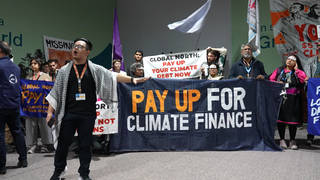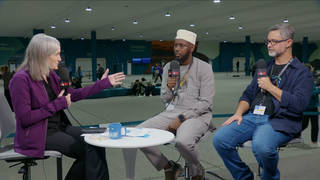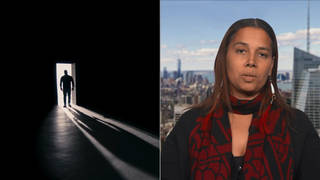
Related
Topics
Guests
- John Cusackstar of War, Inc. He also co-wrote the film. His other Iraq war film, Grace is Gone, came out last year.
- Jeremy Scahillauthor of the bestselling book Blackwater: The Rise of the World’s Most Powerful Mercenary Army, for which he received a Polk Award. The updated paperback version of the book is being published on June 3rd.
John Cusack joins us to talk about War, Inc., his new film taking on issues few in Hollywood today would dare to: war profiteering, mercenaries, political corruption and embedded journalism. A political satire, the film stars Cusack as Brand Hauser, a hit-man for hire who is deployed to the fictional country of Turaqistan to kill a Middle Eastern oil baron. Hauser’s employer is Tamerlane, a secretive for-profit military corporation headed by a former US vice president played by Dan Aykroyd. We also speak to Democracy Now! correspondent Jeremy Scahill, author of the bestselling book Blackwater: The Rise of the World’s Most Powerful Mercenary Army. [includes rush transcript]
Transcript
JUAN GONZALEZ: War, Inc. is a new film opening in New York and Los Angeles today that takes on issues few in Hollywood today would dare to: things like war profiteering, mercenaries, political corruption and embedded journalism.
A political satire, the film stars John Cusack as Brand Hauser, a hit-man for hire who is deployed to the fictional country of Turaqistan to kill a Middle Eastern oil baron. Hauser’s employer is Tamerlane, a secretive for-profit military corporation headed by the former US vice president, played by Dan Aykroyd. This is a part of War, Inc. where Hauser receives his mission orders.
BRAND HAUSER: Turaqistan. What’s the gig?
TAMERLANE CEO: Omar Sharif.
BRAND HAUSER: Omar Sharif?
TAMERLANE CEO: Yeah, CEO of Wuji Gas [phon.], the Yujigastani [phon.] conglomerate. Terminate. Do do that voodoo that you do so well. You’ll be working directly under the viceroy, just appointed by the president. His identity is still being withheld until further notice. It’s on a need-to-know basis.
BRAND HAUSER: And no one needs to know.
TAMERLANE CEO: He asked for you personally.
BRAND HAUSER: What’s my cover?
TAMERLANE CEO: Trade show producer.
BRAND HAUSER: Trade show? What show? What show? What show?
TAMERLANE CEO: Oh, it’s going to be huge, Hauser. Tamerlane is sponsoring a trade expo, Brand USA. It’s our big launch, bringing democracy to this part of the world. Plus, now that we’ve bombed the [blank] out of them, well, there’s a lot of rebuilding to do.
BRAND HAUSER: Shows a nice spirit.
TAMERLANE CEO: Well, somebody has to help these poor people. This moment presents a great opportunity for Tamerlane, and the United States, for that matter, not to mention the people of Turaqistan. To top it all off, there’s going to be a gala wedding! Isn’t that great?
BRAND HAUSER: Seems like a pretty elaborate cover. I’m actually going to be responsible for all that [blank]?
TAMERLANE CEO: This is a historic moment, Hauser: the first war ever to be 100 percent outsourced to private enterprise. Tamerlane jets. Tamerlane tanks. Tamerlane soldiers. And to top it all off, a Brand USA Expo. It’s your show, baby.
AMY GOODMAN: An excerpt of War, Inc. The film opens in New York and Los Angeles today.
John Cusack joins us now from London, where he’s shooting a new film. In addition to starring in War, Inc., he also co-wrote and produced the film. His other Iraq War-themed film is Grace is Gone. It came out last year, and it’s coming out on DVD next week.
We’re also joined by Democracy Now! correspondent, Jeremy Scahill. His book, Blackwater: The Rise of the World’s Most Powerful Mercenary Army, is coming out next week in paperback.
John Cusack, welcome. Thank you for taking time from making your new movie. Talk about the genesis of this film, War, Inc.
JOHN CUSACK: Well, hello, and thanks for having me on the show. I’m a great admirer of it.
I think, probably like a lot of the great journalists that you’ve mentioned and the other guest you have on the show, Jeremy Scahill, I think I was probably trying to put the Iraq fiasco into a larger context and maybe put it through a different sort of lens and tell a different narrative than I think the corporate narrative that we’ve been getting about the Iraq War and explore some of these themes.
You know, when we hear these words like “privatization,” you know, what does that mean? And in the case of the Iraq War, it meant outsourcing what you would imagine to be the very core functions of government and the very thing that makes you a state, to turn that into a for-profit business. And we’ve gone so far down the rabbit hole now, where actually torture is being outsourced. So it’s strange and savage times. So that was really kind of the genesis of it.
And there’s also a climate where people were telling Americans to watch what they say and — you know, and the hypocrisy and I think — and the stench of lies was so intense, you know, it would make your eyes water. So, as a filmmaker and citizen, you think, well, how do you contextualize this? And so, that was really why I wanted to make it.
AMY GOODMAN: Let’s go to another clip of War, Inc., where Brand Hauser confronts the head of the CIA, played by Ben Kingsley.
WALKEN: Every empire is summed up in Rome. The Romans, Hauser, dudes of the human race, torchbearers of culture. You and I are centurions, honor bound to defend civilization against the barbarians.
BRAND HAUSER: Let’s cut the [blank], Walken. I like killing people as much as the next guy, but I signed up to kill the bad ones. Health clinics, trade unionists, journalists, agricultural co-ops, Catholic liberation theologians, impoverished Colombian coffee farmers — these are the barbarians, the depraved opponents of civilization? We turn Central America into a [blank] graveyard. Whoever momentarily interrupts the accumulation of our wealth, we pulverize. I’m just not feeling good about that anymore, sir.
WALKEN: Then do what you have to do, son.
AMY GOODMAN: Excerpt from War, Inc. Juan?
JUAN GONZALEZ: Well, John Cusack, obviously you’re dealing with weighty and tragic situations, but you’ve chosen satire. Why the satire approach, did you feel was necessary?
JOHN CUSACK: Well, I think, you know, all satire or absurdism does is take current trends to the logical conclusion, you know, if you follow it a couple weeks or a couple years down the road. And some would argue, I think rightfully so, that we’re already there. So, you know, I think at times you have to put a different lens on it in order to kind of process the information, I think. And, you know, there’s a great tradition of satire mocking power elites and — you know, whether they be kings or corporate kings — and you know, shaming them and naming things and calling things what they are.
AMY GOODMAN: John Cusack, what about Hollywood in this time of war? Your assessment of your industry?
JOHN CUSACK: I don’t know. I think that there are individuals out there who are trying to do good work, and so I don’t like to lump people into a kind of groupthink kind of — I don’t like to sort of think that way. You know, obviously, the industry really wants to make money and protect itself, and I think, like the rest of the country, people have been, I think, kind of zonked spectators just going along this conveyor belt and not really wanting to face what this particular administration has done to the Constitution and to the very idea of America and democracy. So I think a lot of people are numb and kind of checked out, I think.
AMY GOODMAN: Jeremy Scahill, your book Blackwater has had such an important effect, and actually it’s as if a part of this film, we’re watching the — sort of what it looks like on film. You wrote a really positive piece about War, Inc. and its importance, especially in the Hollywood commercialized climate we’re in today.
JEREMY SCAHILL: Well, you know, first of all, I mean, John Cusack is really to be commended for this. I mean, he and I have had a dialogue ongoing over the years. I mean, it’s kind of funny. When you talk to a lot of unembedded independent journalists who have been to Iraq, almost all of us started receiving calls from John Cusack shortly after the invasion of Iraq began. And John was calling people not because he was saying, “Hey, I’m going to do a movie,” but because he wanted to know what was going on. And so, he was calling me, he was calling Naomi Klein, he was calling other people who had been in and out of Iraq and was trying to gather information.
And, you know, I grew up — one of my favorite films was John’s movie Say Anything, and you remember that famous scene where he’s standing outside of the home of the woman that he loves, and he’s playing Peter Gabriel’s song on a boombox above his head. It’s one of those sort of iconic moments of film, and certainly for my generation. And now, I sort of see John as standing outside the gates of Hollywood with a sort of cheap TV over his head saying, “Hey, you know, these are political films about the Iraq War. You know, do something about it.”
I mean, we have to remember, this is the most radically privatized war in the history of this country. I don’t think most people in this country or around the world can name more than three or four countries that have an official deployment in Iraq, and yet there are 630 corporations on the US government payroll. And so, what John has done here is not some over-the-top film; it’s actually more true than fiction, in a way.
You know, you have journalists in the movie who are embedded inside of the Emerald City, which is sort of, you know, John’s version of the Green Zone, and they’re watching the war in an IMAX theater. And there’s a scene where John’s character is actually eating popcorn, you know, sitting next to Marisa Tomei’s character, who’s a sort of progressive journalist who’s come there to muckrake. But it’s not over the top. It actually is more true than what you read in the pages of the New York Times.
And I think that John is really to be commended for doing what is actually not a satire; it’s a very powerful commentary on the way things actually are in Iraq right now and with the US war machine. It’s sort of a combination of A Clockwork Orange, Wizard of Oz, or a sort of, you know, political Muppet Show, so to speak, that actually says a lot and has a very stark commentary on the way things are.
JUAN GONZALEZ: And yet, almost predictably, a lot of the commercial media have been panning the film, right?
JEREMY SCAHILL: Oh, absolutely. I mean, this is sort of the hubris of power journalism, you know. I mean, one of the — a New York Times reviewer said something like, you know, that satire has to be in the current moment and that this film was looking backwards and sort of implying that this was — this was a moment in time when Paul Bremer was there. No, no, no, this is the Cinnabon war. I mean, you can go to war with a cappuccino right now. This wasn’t something that happened in 2004 for a year. It’s on right now. I mean, there’s recent reporting talking about how troops are now becoming obese because of all of the fast food that’s being fed to them inside of the Green Zone and these other heavily fortified areas. I mean, this film is a better reportage than a lot of what we see in the corporate media.
AMY GOODMAN: And, John Cusack, you have some of the biggest stars going in this film: of course, you, yourself, and you’ve got Marisa Tomei, you’ve got Hillary Duff, you’ve got Ben Kingsley, you’ve got Dan Aykroyd.
JOHN CUSACK: Yeah. And all of these artists kind of jumped in and were very gung-ho about doing it. And what’s been so kind of pleasing is that many of the people who I deeply respect and admire and who are courageous journalists and writers and thinkers, like Jeremy, whose book has been so influential, and Naomi Klein, whose groundbreaking work is universally recognized, and the list goes on and on, who have knowledge of the situation, have all kind of come to support the film and defend it. And I think it’s because — since they’ve been there and they know that this is the prime example of this ideological mission to sort of hollow out the government and privatize it and privatize everything in sight.
And if you want that sort of a world and if — and, you know, I think in Jeremy’s book, Erik Prince said he wants to do for the military what FedEx did to the post office. And I believe he said it with a straight face, as if running a for-profit occupation in the Green Zone is nothing more than delivering the mail. If private corporations should be able to defy international law and shred the Constitution and blow up the streets to protect a corporation’s interests and do it all on our dime, you know, if that’s the future that we want, that’s the future we’ve got. So if the reviewers say we’re looking backwards, I don’t know what they think the current state of the world is right now.
AMY GOODMAN: Jeremy Scahill?
JEREMY SCAHILL: Well, you know, John points out this comment that Erik Prince made about FedEx. I mean, Erik Prince recently reemerged from the Great Dismal Swamp in North Carolina where Blackwater is based to give a speech in Michigan in front of his, you know, friends and family and supporters, and it was actually at the Amway Grand Plaza. You know, Amway Corporation — his sister married the heir to the Amway Corporation fortune.
AMY GOODMAN: Dick DeVos.
JEREMY SCAHILL: So he goes there to give a speech — right, Dick DeVos — and no tape recorders or cameras were allowed into it, but he said during that speech the exact same thing. He said, “When you want to send a package overseas, do you use the post office, or do you use FedEx?” implying that Blackwater is sort of the Federal Express of the US war machine, that it’s the best way to get your product delivered.
But there’s actually an irony there. When you send something via FedEx, you can have your package insured against loss or damage, you can track your package. Blackwater has shown itself above any form of tracking or accountability. And when things go lethally wrong, you can’t find out. There’s no consequences. There’s no accountability whatsoever. So even when Erik Prince tries to spin a metaphor about another corporation, it falls flat, because Blackwater is the least accountable corporation operating in Iraq right now, because its product is essentially death and destruction.
One thing I wanted to say, though — and John won’t bring this up, because he’s too modest — you know, John gets these big budget films. He’s shooting one right now, where, you know, there’s a lot of money at play, there’s a lot of commercial value to them. He’s been bankrolling these projects in part with his own money, because he can’t find big Hollywood production companies willing to pay for it.
AMY GOODMAN: It’s also interesting, John, that when filmmakers do films about war, they can get access to high-tech, taxpayer-funded, otherwise unavailable military gear from the military. In return, of course, the military has the right to alter the script, like with movies like Black Hawk Down. Your comment about that? And also maybe you could just quickly comment on Grace is Gone, which is gone from the movie theaters now but a very powerful film about a woman soldier who is killed and then her family surviving here.
JOHN CUSACK: Well, I think, you know, I’m just very grateful that programs like this and a large activist base and some writers and thinkers — you know, we have a MySpace site where we have a list of people who I deeply respect, who have come out to defend and support the film and help get it out there. So there are avenues to get this out, but the corporate media, yeah, has been predictably soft in looking into the deeper meanings of satire and, you know, that art is about ideas, and ideas have consequences.
And also, it’s a fun, funny, entertaining movie, because I think subversion and throwing bricks at the right sort of people is supposed to feel good. So I think it reclaims a spirit of resistance and a spirit of defiance that I think is the first step towards action, because I think a lot of us are sort of depressed about all this. So I think if it does those things — and we have the support of so many terrific people — I think the film will find an audience.
But as far as the corporatization, the military corporatization of Hollywood, yeah, if you want to make a movie that glorifies violence in a very predictable way, you can get a whole bunch of backing and a whole bunch of product placement.
AMY GOODMAN: John Cusack, I want to thank you so much for being with us, joining us from London. His film War, Inc. opens in Los Angeles and New York today. Jeremy Scahill is launching his book on June 3rd at Town Hall in New York, and he’ll be back to talk about that book.
JOHN CUSACK: Which — that should be a must-read.












Media Options